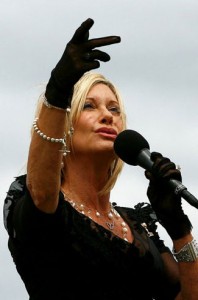Hi, there, you four remaining people who are still checking back to see whether I’ve posted anything. Just to prove this is really Sean, I’ll make this about homosexuality and atheism and partisan politics and Japan.
The Unreligious Right linked last week to this very good post about being an atheist out in the public debate. The one problem, as commenter lilacsigil points out, is with the comparison Christina uses to illustrate why it’s out of line to tell self-identified atheists that they’re not actually atheist:
Let me make an analogy. If you’re not gay, would you say to a gay person, “You don’t understand what it means to be gay”? Would you say to them, “Being gay means that 100% of your sexuality is directed towards people of the same sex”? Would you say to them, “If you’ve ever had sex with someone of the opposite sex, or have even had a slight passing inclination to be sexually interested in someone of the opposite sex, then you’re not really gay”?
Would you say to a gay person, “I understand what ‘gay’ means better than you do”?
If you were a busybody, you most certainly would. And, non-hypothetically, if you are a busybody of that particular type, you most certainly do.
Plenty of anti-gay commentators (both in the media and in informal conversation) are constantly telling us there’s no such thing as a “real” homosexual (we’re just confused, underdeveloped heteros with unexplored anger toward the opposite sex, you see) and that we’re practicing gays because we don’t want to do the hard work of facing up to the truths of nature and the moral strictures that flow from them. If you’re both gay and atheist, the condescension is even more dismissive–along the lines of “You just don’t want to believe in God because if you did you’d have to exercise sexual discipline.” (No, not everyone is like that, but I’m only talking about busybodies.) Anyway, Christina’s post is very good, and so are the comments, some of which are hers.
[Added after loading the dishwasher and pouring a Scotch: Actually, if you really want to ensure you can never discuss anything but the weather with new acquaintances without stepping into a political minefield and being informed what you think, you can try being gay, atheist, and libertarian. Sententious busybodies on the right will be happy to tell you that you’re a libertine who wants to pretend society doesn’t need rules and order; sententious busybodies on the left will be happy to tell you that you don’t want to acknowledge the degree to which circumstances beyond people’s control affect their ability to make their way in life. And both sides will be happy to tell you you’re not a “real” libertarian if you happen to take a position that isn’t congruent with whatever they’ve decided the libertarian position should be based on some article they read in The Wall Street Journal or something a few years ago. Both sides like to use the same triumphant, “GOTCHA!” tone, too.]
*******
This diavlog between Michelle Goldberg and Megan McArdle (who’s a libertarian, not a conservative, but who’s naturally seen as being “on the right” in our current political climate) is almost a month old now, and it got a lot of attention when it was posted. Still, if you haven’t watched it, there’s a lot to munch on that’s illustrative of the way things are framed in the public debate lately. I particularly thought this was interesting:
My sense is that Goldberg’s reflexive assumption about gun owners—that they’re running about eager for an opportunity to shoot someone—is shared by a lot of people, but I don’t think she’s right. McArdle doesn’t go into much detail, but the way she describes the gun enthusiasts she’s met fits those I know, too: they enjoy shooting at the range, and they like the feeling of autonomy that not depending on 911 in an emergency gives them, but that doesn’t mean they enjoy contemplating killing an actual human being. Instead, they rest easier knowing that they’re prepared if they meet some miscreant who threatens them or their property when the police are too far away to do anything about it. It really is a self-reliance thing, and I agree with McArdle that it’s likely that that’s the message those who wear their guns to so-called Town Hall meetings or protests were trying to send: don’t think you have to patronize me, Madam Senator, or protect me, Mr. Congressman—I can handle my own life and only need you to stop getting in my way.
That having been said, I think McArdle’s right about the PR factor. Carrying a deadly weapon to a political protest is a great way of signaling that you (at least) think there may be occasion to use it, which does not help to bring the tenor of debate back down toward poised, reasonable argument.
*******
New Japanese Prime Minister Yukio Hatoyama met with President Obama this week. (He also addressed the UN General Assembly and was presumably in one of the motorcades that made getting to work or home in Midtown East utter hell.) The
Asahi editorial contained this priceless quotation:
The chiefs of the Democratic parties that govern Japan and the United States met for the first time.
This fresh start for the bilateral relationship came after Prime Minister Yukio Hatoyama took over government by promising “change” from more than half a century of virtually one-party rule by the Liberal Democratic Party, and U.S. President Barack Obama took power by promising “change” from eight years of the presidency of George W. Bush.
After the meeting, Obama told reporters he is “very confident that not only will the prime minister succeed in his efforts and his campaign commitments, but that this will give us an opportunity to strengthen and renew” the alliance between the two countries.
And Obama should know, because, after all, he’s all about keeping campaign commitments (to rein in spending, to close Guantanamo, to prohibit anything that could be construed as torture in the prosecution of the WOT) and strengthening and renewing alliances with existing partners.
Hatoyama apparently wanted to convey his intention to guide his nation away from this traditional relationship [i.e., Japan’s playing second fiddle to the United States–SRK] toward new relations in which Japan is more assertive and ready to play a more active role.
…
Some tricky issues were not discussed at the Hatoyama-Obama meeting but must eventually be addressed. Among them are Tokyo’s plans to terminate the Maritime Self-Defense Force’s mission to refuel coalition vessels in the Indian Ocean and review the realignment of the U.S. forces in Japan, including the planned relocation of the U.S. Marine Corps Air Station Futenma.
The Japanese government must make decisions on these issues before Obama’s scheduled visit to Japan in November.
Mishandling these delicate issues could strain Japan-U.S. relations and stir up criticism against the Hatoyama administration at home.
A power transfer can lead to a major policy shift. What is happening in Japan now is a natural part of democracy. The diplomatic challenge facing Hatoyama is how to persuade Washington to accept this change in Japan without hurting the mutual trust.
Well, it might be noted that the push for a permanent UNSC seat for Japan began under Koizumi and that the plans to restructure United States military deployments to have fewer personnel in Japan began under Bush; I’m not sure those things represent substantive change as much as evolution in a preset direction. The nuclear-disarmament part sounds nice, but surely everyone is aware, underneath the genial dialogue, that it’s not going to happen now that the toothpaste is out of the tube. And Japan has spent decades talking about internationalization and global outreach, but those processes are a two-way street, and the adapting it would need to do at the level of nuts-and-bolts approaches to politics and business is not one that it welcomes.
“This yuai (fraternity) is a way of thinking that respects one’s own freedom and individual dignity while also respecting the freedom and individual dignity of others,” he said during his 20-minute speech in English.
He said that based on the spirit of yuai, Japan can become a bridge for the world in five areas.
I’d love to see Japan, as the most mature democracy in the region, take more of an active geo-political role, but I’m not sure it’s going to happen on what seem to be the current trajectories. Serving as a “bridge” between the rest of the world and Asia makes sense given Japan’s economic power and corresponding contributions to the UN. But fraternity (the Japanese word indicated actually means more like “friendship” or “amicability,” but let that slide) among East and Southeast Asian peoples is notoriously unstable, despite their many elements of shared heritage, and Japan’s history does not, shall we say, establish it unequivocally as the obvious choice for role of altruistic, disinterested referee.

